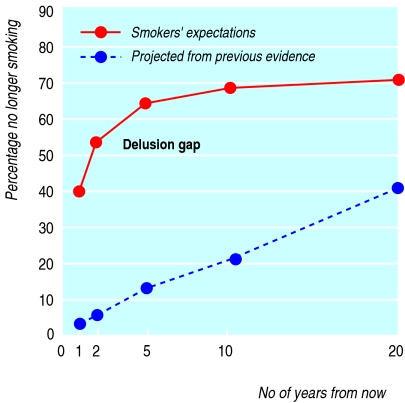Editor—Our survey of a representative national sample of 893 smokers shows that most are disenchanted with smoking and claim that they would not smoke if they had their time again.1 Furthermore, most smokers overestimate the likelihood of stopping in the future and greatly underestimate how long it is likely to take.
When asked: “If you had your time again would you start smoking?” 83% of current smokers replied that they would not (79% men, 87% women). Those aged 45 to 64 were most regretful, 90% saying that they would not smoke given their time again. This may reflect the mounting distress of smokers reaching the age at which the main smoking related diseases are becoming noticeable in themselves and among their peers. Given the supposedly carefree and rebellious image attributed to teenagers and young adults, young people were also very disenchanted with smoking: 78% of those aged 16 to 24 declared that they would not smoke given their time again.
We also tested expectations about stopping smoking in the future. We asked: “Looking ahead, do you think you will still be smoking in 1 year's time, or will you have given up?” Those who responded that they would still be smoking were asked the same question looking ahead to 2, 5, 10, and 20 years' time. We checked how realistic smokers' expectations about stopping were by using data from the health survey for England to look at the proportion of ever smokers that had stopped in the equivalent time periods looking back from now.2
The figure shows a delusion gap—a sharp misalignment of expectations about the timing of successfully stopping and the experience of recent history, particularly in the near term—with 53% expecting to stop within two years, but only 6% managing this in recent history. Women were more likely than men to think that they would stop smoking by one year (45% v 34%), and younger smokers were more optimistic than older smokers (47% of those aged 16-24 v 15% of those aged over 64). Poorer smokers were less likely to think they would have given up by one year (33% among the poorest v 47% among the most affluent).
Eighty per cent of smokers under 40 believe that they will have stopped within 20 years; on average they believe they will stop within three years. Recent history shows that only 46% of ever smokers are still smoking at the age of 60.
The widespread disaffection with smoking among smokers combined with their tendency to be deluded about how easy and quick it will be to stop justifies extra urgency in promoting chances to stop. No Smoking Day on 13 March 2002 is an important opportunity to help smokers take on a realistic view of the difficulties of overcoming nicotine addiction. It will prompt smokers to make a credible attempt at stopping so that they can live the life they would want if they had their time again.
Figure.
Smokers' optimism about stopping smoking showing predicted and likely cessation rates
References
- 1.National Statistics. Omnibus survey for ASH (M298) smoking: weight A October and November 2001. London: National Statistics; 2002. [Google Scholar]
- 2.Erens B, Primatesta P, editors. Health survey for England: cardiovascular disease '98. London: Stationery Office; 1999. [Google Scholar]



